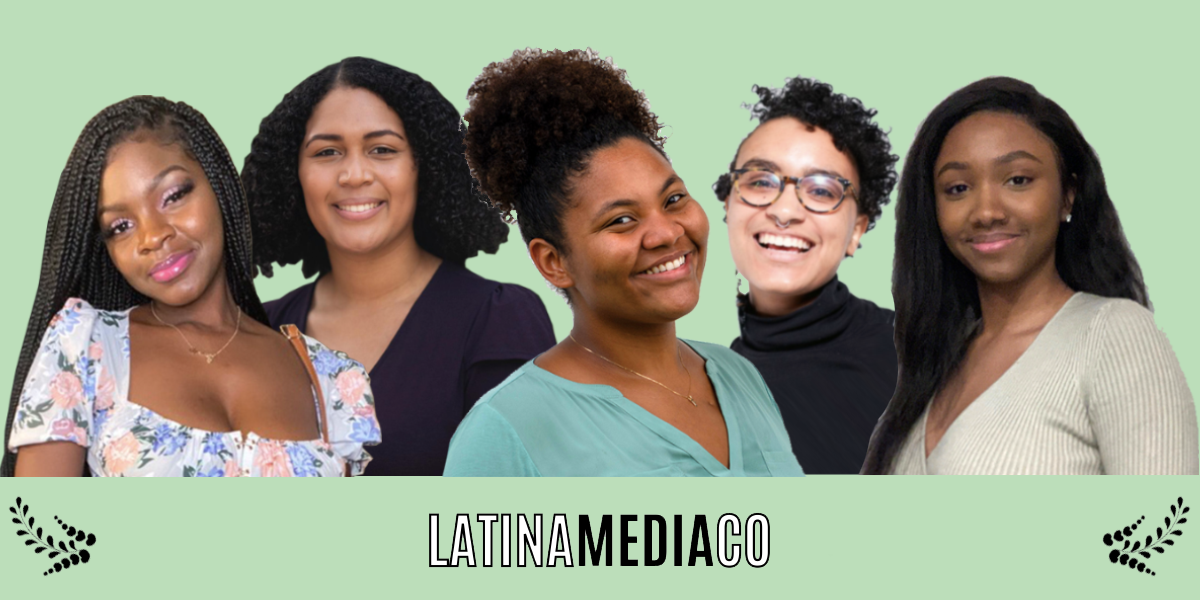To overlook the African roots throughout Latin America is to tell a drastically incomplete story of our beautiful culture. I am a Haitian, Cuban, Italian Afro-Latina, but that is not always something I felt comfortable fully embracing. To explore why, I recently convened other Afro-Latinx femmes to talk about Black identity within the Afro-Latinx community and the spectrum of what that looks like, from full acceptance to complete denial. Afro-Cuban actress, Aria MG, said it right: “Being Afro-Latinx is probably one of the most common things ever in the Latinx and Hispanic community.”
The term “Afro-Latinx” is a fairly new term that you’ve maybe heard at school or seen online. It simply means, Black Latinx people. Some people, like novice bass player Ángel Mak, don’t consider themselves Afro-Latinx if their Latinx heritage comes from non-Black lineage. Ángel says their father is African-American but their mother is a White Puerto Rican so they consider themselves to be both Black and Latinx but not Afro-Latinx because their lineage differs from someone like, AIT student Michelle Balanta, who was also part of the discussion and is a Black Colombian with two Colombian parents. The way you choose to identify is ultimately up to you, but in short, an Afro-Latinx person is someone who has both Black and Latinx lineage.

Being Afro-Latinx is probably one of the most common things ever in the Latinx and Hispanic community.
Highlighting the Afro roots of different communities became increasingly more important once we found ourselves in a post-Trump world. Many Afro-Lartinx kids grow up with similar experiences of Black erasure or denial like in game writer, Giselle Francis’, family. She grew up in an Afro-Puerto Rican household that did not talk about their Blackness. She said, “I didn’t realize, growing up, you could be both Black and Latina” and spoke about the shift in her mother’s conversations with her and her sisters after Trump took office in 2016, and racism arguably became less concealed. Giselle’s mother started to tell her the horror stories her father lived through as an Afro-Puerto Rican, warning Giselle and her sisters against the prejudice and racism within the world.
Like any people group, the Latinx community and its anti-Blackness is on a spectrum. On one end of the spectrum lies people like the father of roller skater Lexi Ellis. Growing up, her father, an Afro-Honduran, would get upset when people called him Black even though he was clearly a Black man. Understandably, this was confusing for Lexi, but is an unfortunately common issue within the Latinx community.

I’ve always been a ‘both’ child. I am both Black and Latina, there is no one without the other.
On the other end of the Latinx spectrum, you have people like Aria MG’s mom who was adamant about her acknowledging her Blackness. If Aria’s mom ever caught her saying “I’m Cuban” without including the “Afro” she would quickly correct Aria, making sure she was not shying away from the fact that their Cuban lineage came from Black roots.
Michelle Balanta grew up around Colombians of all different colors so seeing all different shades of faces speaking Spanish was nothing strange to her, until she moved to Houston. During our conversation she said, “People try to test me speaking Spanish, because they don’t believe it was my first language. They just don’t know their history”, and she’s absolutely right. It’s interesting that people still turn their heads in amazement and question Black people who speak Spanish, as if Blackness cannot exist within Spanish-speaking cultures. This shock at Blackness within Latinx spaces comes from years of Black denial and refusal to highlight Black Latinx celebrities. Growing up, Michelle remembers loving her Latinx culture and looking up to Latinx celebrities she could never truly see herself in. After her move to Houston, she began to let her Latinx culture go as she finally found a group she felt she belonged to – the Black kids at her school.

People try to test me speaking Spanish because they don’t believe it was my first language. They just don’t know their history.
Not only do Afro-Latinx people have to choose between their Latinidad and their Blackness socially, they quite literally have to make a choice on many forms that ask about race and ethnicity. For people of two or more ethnicities or races, those forms can be stressful to fill out.
Many of the forms include the choice of “Two or more races (not Hispanic or Latino)” or “Black (not Hispanic or Latino),” not allowing Afro-Latinx people to claim both their Afro heritage and their Latinx heritage. Sometimes Lexi said she’ll just put “Other.” Giselle said it really depends on the day. And Ángel said, “If it’s too much of a headache, I just put Black.” The distinction between race and “Hispanic or Latino” on these forms doesn’t make sense, but every day Afro-Latinx people are asked to choose which parts of them they want to represent.

If it’s too much of a headache, I just put Black.
Latinx culture is Black culture, the two are intertwined and we are finally starting to recognize that. Latinx and Black history are as Lexi said in our discussion, “I am both Black and Latina, there is no one without the other”, we cannot discuss Latinx history and culture without also talking about Black history and culture. The erasure of Blackness from Latinx spaces is not only an inaccurate portrayal of history, it is damaging to Afro-Latinx people. The repression of Blackness comes from a long history of racism that has caused Afro-Latinx people to feel like they have to choose between their Blackness and their Latinidad. There exists a world where people can embrace all ethnicities and races they are part of and it starts with acknowledging Blackness in the Latinx community and inviting all shades of Latinidad to the table.

